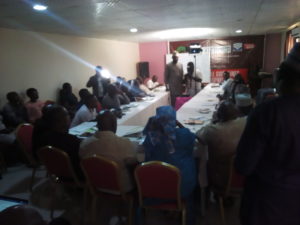News
PLASCHEMA Trains Plateau State Contributory Health Management Agency Staff, Stakeholders
By Jide Afolabi, Jos
The Plateau State Contributory Health Care Management Agency, PLASCHEMA, has organised capacity building on health financing for the Plateau State Contributory Health Management Agency Staff and Stakeholders.
The objective of the 5-day workshop was blueprint development, validation of the basic minimum package for the State Social Health Insurance and development of operational guidelines and capacity building for the stakeholders and staff of PLASCHEMA.
In his welcome address, the Director-General of the Agency, Dr Fabong Jemchang Yildam said that many people died because they could not afford health bill even as little as five thousand Naira saying that “The catastrophic out of pocket expenditures on health have threatened individuals, families and communities. What we report may be a tip of an iceberg because of either the poor health-seeking behaviour of our people or the fear of the financial implications of visiting the hospital”.
He added that “As a people, we sought solutions to the myriad of issues around these, and to that extent, a bill for the creation of the State Social Health Insurance Scheme was developed. The 8th Assembly passed the Bill for the creation of Plateau State Contributory Healthcare Management Agency on May 28th, 2019, and with the assent of His Excellency, the Executive Governor of Plateau State, Dr S.B Lalong on June 3rd, 2019, the Agency was created to serve as part of our state’s dedicated institutional framework for achieving Universal Health Coverage, UHC, on the Plateau.
Fabong noted that PLASCHEMA has been poised to strengthen health financing by pooling resources and through strategic purchasing, mitigate high out of pocket expenditure and poor Health Insurance coverage for citizens.
“With the global endorsement and reaffirmation of the UHC and its incorporation into the Sustainable Development Goals as a target by 2030, it has become very necessary to prepare those responsible for the attainment of UHC with the required knowledge and skills. To reduce any chance of not achieving UHC, we have brought together a mass of expertise required to translate political will to operational guidelines, with the aid of technical support to build capacity”.
The final day of the workshop witnessed a recap of the workshop and feedbacks which was facilitated by Solomon Kwakfut and Dr Fabong. Thereafter, a two Technical Working Group which would work on the development of operational guidelines for PLASCHEMA were formed. The groups comprised various stakeholders including Labour Unions/Associations, Health Maintenance Organisation (HMOs), Sister Agencies, Civil Society Organisations, Professionals Bodies, Partners, Community leaders and the media among others. The groups are expected to work for a period of two weeks and reconvene for ratification of the drafted guidelines.

There were goodwill messages from partners, Nigeria Medical Association (NMA), Christian Aid in Nigeria (CHAN), PLASMEDA, Nigeria Labour Congress (NLC), and United Healthcare International, a Health Maintenance Organisation (HMO) among others. They all appreciated the state government and PLASCHEMA for the laudable initiative promising to give the Agency the maximum support and cooperation to achieve its mandate.
Speaking with journalists after the workshop, the Director-General, Dr Fabong Jemchang Yildam said that “We have been able as an Agency to develop a blueprint and we have looked at the minimum benefit package. With contributions from the stakeholders, we have as well looked at the guidelines.”
While feeding question on those captured by the scheme, Fabong said, “Plateau State Contributory Health Care Management Agency designed a minimum benefit package that could cover those in the formal and informal sectors including the vulnerable, people with disability and people who are internally displaced and we captured orphans and vulnerable children as well. They are adequately captured with the minimum benefit package of Plateau State Contributory Health Care Management Agency but we cannot start the sensitisation of the people without getting the views of the gatekeepers who are essentially the stakeholders which is why we started with the stakeholders and we all agreed that the State Social Health Insurance Scheme is a very important intervention of the Rescue Administration. So, we can now enter the communities with the permission of the stakeholders and they can sell the story of the State Social Health Insurance Scheme to the nooks and crannies of Plateau State”.
-

 News5 days ago
News5 days agoInsecurity: Kogi Schools Resume On Monday
-

 Opinion4 days ago
Opinion4 days agoDon’t Pull the Plug: Why Nigerians Are Pleading for the U.S. to Extend Its Police Training Program — and Why It Must Synergize With New Military Arrivals
-

 Crime4 days ago
Crime4 days agoVigilante Reportedly Shoots Colleague Dead In Plateau
-

 Crime4 days ago
Crime4 days agoMan Shot Dead In Ambush Along Jol-Sho Road In Plateau

